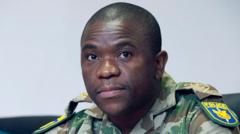In a remarkable turn of events, General Nhlanhla Mkhwanazi, a highly regarded figure in South Africa’s police force, has cast a spotlight on his government, alleging that organized crime syndicates have infiltrated the upper echelons of President Cyril Ramaphosa's administration. Mkhwanazi, widely respected for his no-nonsense approach, made these shocking claims during a press conference where he was flanked by masked officers wielding automatic weapons, emphasizing the seriousness of his allegations against Police Minister Senzo Mchunu.
The general accused Mchunu of having ties with criminal organizations and claimed that he had disbanded an elite unit dedicated to investigating political assassinations after it exposed a drug cartel with connections reaching into the business realm, prison systems, and judicial entities. “We are on combat mode; I will confront the criminals directly,” Mkhwanazi stated, making these comments during a live broadcast earlier this month.
Concerns surrounding organized crime in South Africa have long been prevalent, and crime analyst Dr. Johan Burger highlighted the severe level of criminal activity in the country. Mkhwanazi’s intervention marks an unprecedented moment, as it is the first instance of a police officer officially accusing a cabinet member of such serious allegations. Mchunu swiftly dismissed these claims, labeling them as "wild and baseless," while he expressed readiness to defend himself.
However, the public response has uniformly favored Mkhwanazi, who currently serves as the police commissioner for KwaZulu-Natal. He became a trending figure on social media platforms, indicating overwhelming public support. "He’s known for his straightforwardness and unwavering dedication," noted Calvin Rafadi, a crime expert from the University of Johannesburg.
Mkhwanazi’s reputation solidified nearly 15 years ago when he suspended crime intelligence chief Richard Mdluli, a close associate of former President Jacob Zuma, for corruption charges. His courage to challenge corruption within the police force earned him gratitude from citizens, though it did ultimately cost him his position at that time.
Having re-emerged as KwaZulu-Natal's police chief in 2018, his role has centered on investigating politically motivated killings amid fierce competition for power and resources in the region. It was the scrapping of an investigative unit by Mchunu that spurred Mkhwanazi's recent accusations, lamenting that numerous criminal cases were stagnating at police headquarters.
"I will die for this badge. I will not back down," he affirmed, embodying his commitment to fighting corruption and crime amidst an institution facing rampant issues of political interference. A recent Human Sciences Research Council survey revealed that public trust in the police has plummeted to a mere 22%.
Despite past investigations into his actions, including a complaint regarding interference in a criminal investigation, Mkhwanazi was recently cleared of wrongdoing—a testament to his resilience in combating crime. Yet, his aggressive tactics have drawn criticism, with allegations of excessive force during police operations.
As Mchunu prepares to step down, Firoz Cachalia, a law professor and anti-apartheid activist, is set to take over as the new acting police minister. Cachalia remarked on the unusual nature of Mkhwanazi's revelations, suggesting that if the claims hold weight, history may vindicate him.
With his credibility now on the line, General Mkhwanazi faces a pivotal moment that could shape his future within the force and redefine the relationship between law enforcement and political entities in South Africa.




















